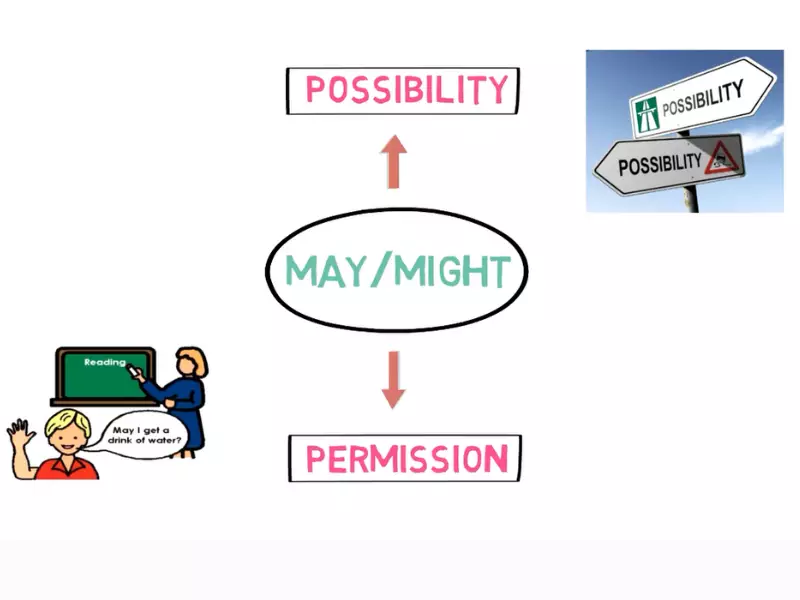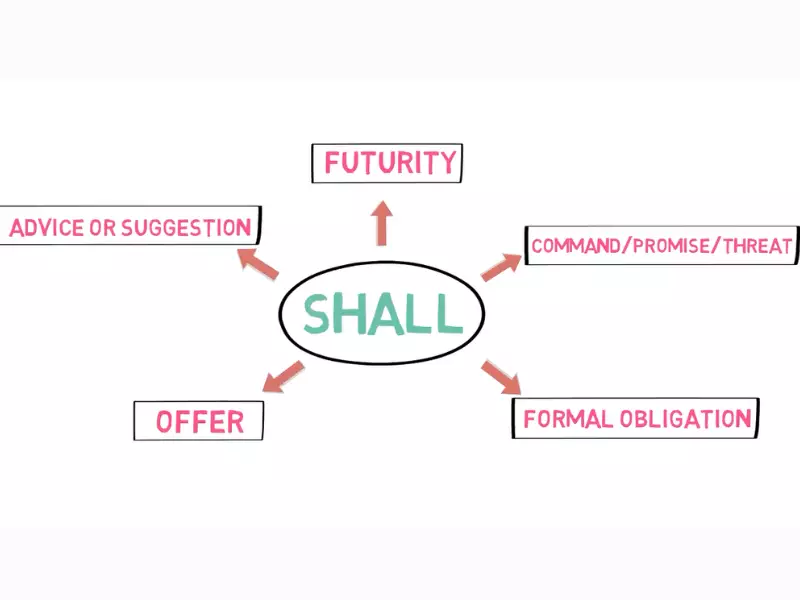The English language is a vast ocean of words, rules, and nuances, making it one of the most complex languages to learn and master. Among its intricacies, the use of modal verbs stands out as a particularly challenging aspect. Modal verbs, such as “shall” and “may,” play a crucial role in shaping the tone, meaning, and formality of our sentences, yet their differences can often confound learners and native speakers alike.
The distinction between “shall” and “may” lies in their application and connotation. “Shall” is primarily used to indicate future actions or obligations, often carrying a formal tone or implying a strong sense of duty. On the other hand, “may” suggests permission, possibility, or probability, offering a more flexible and sometimes polite way to express oneself. Understanding when and how to use these modal verbs correctly can significantly impact the clarity and effectiveness of communication.
Exploring the nuances of “shall” and “may” reveals their significance in English grammar. These modal verbs are not merely interchangeable; they embody different degrees of certainty, permission, and obligation. By dissecting their usage, one can appreciate the precision and subtlety of English language expression, enhancing both written and spoken communication.

Modal Verbs Overview
Definition of Modal Verbs
Modal verbs are auxiliary verbs that express necessity, possibility, permission, or ability. Unlike other verbs, they do not change form (they do not use “-s,” “-ing,” or “ed” endings) and they are used with a main verb to convey the mode or manner of the action described by the main verb.
Role in English Sentences
In English sentences, modal verbs serve to adjust the meaning of the main verb, allowing the speaker to express a wide range of attitudes towards the action. They can indicate likelihood, ability, permission, or obligation.
Examples of Common Modal Verbs
Common modal verbs include can, could, may, might, shall, should, will, would, must, and ought to. Each of these verbs serves to convey different nuances and levels of formality in communication.
Shall: Definition and Usage
Historical Context and Definition
Historically, “shall” originated from Old English and was used to express future action or obligation. Today, it is most commonly associated with formal contexts, contracts, or legal documents.
Formal and Future Tense Applications
“Shall” is used to indicate future actions or decisions, especially in formal writing. It suggests a certain level of obligation or determination from the subject.
Examples in Sentences
- “You shall receive your package by tomorrow.”
- “The company shall pay the invoice within 30 days.”
Legal and Formal Contexts
Usage in Contracts and Legal Documents
In legal documents, “shall” is often used to express obligation or requirement, making actions mandatory. It is a powerful tool in contracts to ensure clarity and enforceability.
Connotation of Obligation or Requirement
“Shall” conveys a strong sense of duty or necessity, implying that the action is not optional but rather a firm commitment or requirement.
Predictions and Offers
Use in Making Predictions About the Future
“Shall” is also used for making predictions about the future, especially when the speaker wants to emphasize certainty or determination.
Expressing Offers or Suggestions
It can be used to make offers or suggestions in a polite or formal manner, often in questions.
- “Shall we begin the meeting?”
- “Shall I open the window?”
May: Definition and Usage
Definition and Contexts of Use
“May” is used to express permission, possibility, or probability. It is more flexible and polite than “shall” and is commonly used in both formal and informal settings.
Permission, Possibility, and Probability Applications
- Permission: “May I leave early today?”
- Possibility: “There may be a strike next week.”
- Probability: “You may find this book interesting.”
Examples in Sentences
- “You may attend the meeting if you wish.”
- “It may rain later today.”
Permission and Requests
Use in Asking for and Granting Permission
“May” is often used to ask for permission in a polite manner or to grant permission graciously.
- “May I use your phone?”
- “Yes, you may.”
Politeness and Formality Aspects
Using “may” for permission requests adds a layer of politeness and formality to the conversation, making it suitable for both professional and personal interactions.
Expressing Possibility
Use in Indicating Possible Actions or Outcomes
“May” is frequently used to indicate actions or outcomes that are possible or likely but not certain.
- “There may be a delay in the delivery.”
Differences in Certainty Levels Compared to Other Modal Verbs
“May” suggests a lower level of certainty compared to “will” but a higher level of certainty than “might,” positioning it uniquely among modal verbs for expressing degrees of possibility.

Comparative Analysis
Direct Comparison Between Shall and May
When distinguishing shall from may, it’s essential to grasp their primary functions. Shall is often associated with formality, obligation, and determination, mainly in legal or formal settings. It is used to denote a future action or an imperative that must be followed. Conversely, may is primarily used to express permission, possibility, or probability, with a softer tone that suggests politeness or uncertainty.
Contexts Where Either Could Be Used Interchangeably
In some contexts, the distinction between these two verbs blurs, especially in informal conversation or certain dialects. For example, when making offers or suggestions, one might say, “Shall we leave now?” or “May we leave now?” with both sentences being socially acceptable, albeit with slight nuances in tone and formality.
Clarification of Common Misunderstandings
A common misconception is that shall and may are always interchangeable, especially by those learning English. However, the crucial difference lies in the intention behind the action described. Shall implies a certain future action or a directive, while may implies a possibility or permission, affecting the sentence’s overall tone and meaning.
Nuances and Flexibility
Subtle Differences in Tone and Formality
The tone and formality between shall and may vary significantly. Shall carries a more authoritative and determined tone, suitable for formal agreements or when asserting a future action. May, however, suggests politeness and hesitation, making it more appropriate for requesting permission or expressing a possibility.
How Context Affects Choice Between Shall and May
The context in which these modal verbs are used greatly influences the choice between them. In legal documents, shall is preferred to assert obligation or intention. In contrast, may is more suitable in social contexts when asking for permission or discussing probable scenarios.
Regional Variations
Differences in British and American English
The usage of shall and may also differs between British and American English. In the UK, shall is more commonly used in formal speech and writing, maintaining its traditional sense of futurity and obligation. However, in the US, shall has become somewhat archaic, with will and may taking precedence in expressing future actions and permissions.
Evolving Usage Patterns Over Time
Over time, the patterns of using shall and may have evolved, reflecting changes in societal norms, communication styles, and language globalization. Shall, once prevalent in both legal and everyday contexts, has seen a decline in common use, particularly in American English. Conversely, may has maintained its role but faces competition from might in expressing possibility and probability.
Practical Applications
Guidelines for Using Shall and May in Writing and Speech
To effectively use shall and may, consider the following guidelines:
- Use shall to indicate future actions or obligations in formal contexts.
- Use may when requesting or granting permission, or to express possibility.
- Be mindful of the audience and context to choose the appropriate modal verb.
Tips for Non-Native Speakers
Non-native speakers should pay attention to the context and desired tone of their message when choosing between shall and may. Listening to native speakers and practicing writing sentences using both modal verbs can help grasp their nuances.
Exercises and Examples
Practice Sentences for Readers to Apply Concepts
- “You shall complete the project by next month.” (Obligation)
- “May I leave the room?” (Permission)
- “It may rain tomorrow.” (Possibility)
Real-Life Scenarios Where the Choice of Modal Verb Matters
- Contract drafting: Using shall to assert the obligations of the parties involved.
- Asking for permission in a formal setting: Choosing may to politely request permission.
- Making predictions: Opting for may to suggest uncertainty about future events.
Frequently Asked Questions
When should I use “shall” over “may”?
Use “shall” to express future actions, obligations, or strong intentions, particularly in formal contexts or legal documents. It conveys a sense of duty or inevitability. “May,” however, is more appropriate for expressing permission, possibility, or asking for permission in a polite manner. Understanding the context and the desired tone of your communication will guide the correct choice between these two verbs.
Can “may” and “might” be used interchangeably?
While both “may” and “might” indicate possibility, they differ slightly in the degree of probability. “May” suggests a higher likelihood of something happening, whereas “might” is used for situations that are more speculative or less certain. Choosing between them depends on how probable you believe the action or event to be.
Is “shall” still commonly used in modern English?
“Shall” has seen a decline in everyday usage, especially in American English, where it is now mostly found in formal, legal, or procedural documents. However, it remains an essential part of the English language, particularly in British English, where it is still used to express future intentions or obligations in formal contexts.
Conclusion
The subtle yet significant differences between “shall” and “may” underscore the richness and complexity of the English language. Mastering their use not only enhances our ability to communicate with precision but also enriches our appreciation for the linguistic tools at our disposal. As we navigate through the myriad rules and nuances of English grammar, understanding modal verbs like “shall” and “may” becomes a key aspect of effective communication, whether in writing or speech.
In conclusion, the journey to grasp the full spectrum of English grammar is ongoing, with each nuance offering a deeper insight into the language’s versatility. “Shall” and “may” are prime examples of how English can convey subtle differences in tone, obligation, and possibility, providing speakers and writers with the means to express themselves more accurately and elegantly.
